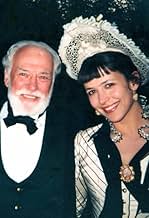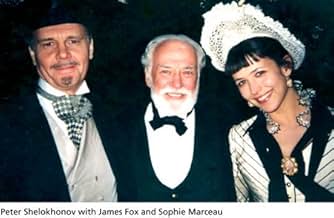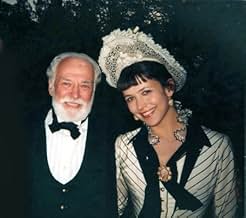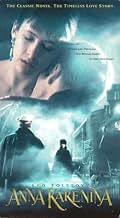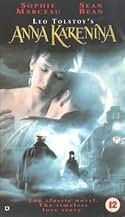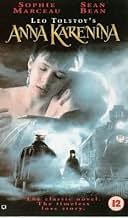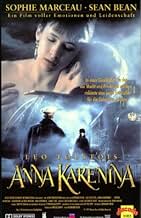VALUTAZIONE IMDb
6,3/10
6345
LA TUA VALUTAZIONE
Anna (Marceau) è una moglie e una madre che ha una relazione con il bel conte Vronskij. Basato sul romanzo di Tolstoj.Anna (Marceau) è una moglie e una madre che ha una relazione con il bel conte Vronskij. Basato sul romanzo di Tolstoj.Anna (Marceau) è una moglie e una madre che ha una relazione con il bel conte Vronskij. Basato sul romanzo di Tolstoj.
Petr Shelokhonov
- Kapitonich, Chief Butler
- (as Pyotr Sholokhov)
Recensioni in evidenza
According to an earlier review, this movie is supposed to be "just plan awful." The writer probably meant "plain" instead of "plan," and that misspelling may be an indication of the quality of the review.
There is much to be said for the viewpoint that this film version of Tolstoy's novel, starring Sophie Marceau, must certainly be one of the greatest versions ever produced.
Tolstoy himself lived to see just the beginning of the era of the motion picture and was said to have been fascinated by the possibilities the new medium presented. If so, he would no doubt have been quite astonished at the beauty and the extraordinary quality of this rendition of his story about Anna Karenina. The production values are among the highest there could possibly be. The costumes, the cinematography, and the sets unlike earlier versions, the film was shot on location in St. Petersburg and elsewhere in Russia are at such a remarkable level that the action almost does appear to be really taking place in the Czarist period at the end of the nineteenth century.
As for Sophie Marceau's mild French accent which the above-mentioned reviewer found so irritating it is quite likely that many upper-classes Russians of the period actually did speak with a French accent. It was not Russian but French that was the dominant language among the Russian nobility and aristocracy of the time for some, French was in fact their native language, since many of them never learned to speak Russian at all, except perhaps a few words and phrases they could use to communicate with the servants.
What is perhaps most remarkable of all in this film is the utterly believable way that the behavior of the of characters is presented. Their motives are suggested with great subtlety, not in the somewhat simplistic tones of the (nevertheless still magnificent) MGM version of the film that starred Greta Garbo seventy years ago. Anna's husband is not a monster, for example, in this new version, but a rather pathetic, right-wing government bureaucrat with obsessively strict moral values. Moreover, the portrayal of Anna's behavior throughout the film, and especially in the final scenes, is a masterpiece of sympathetic psychological insight and understanding.
This film is a for the time being, anyway neglected classic.
There is much to be said for the viewpoint that this film version of Tolstoy's novel, starring Sophie Marceau, must certainly be one of the greatest versions ever produced.
Tolstoy himself lived to see just the beginning of the era of the motion picture and was said to have been fascinated by the possibilities the new medium presented. If so, he would no doubt have been quite astonished at the beauty and the extraordinary quality of this rendition of his story about Anna Karenina. The production values are among the highest there could possibly be. The costumes, the cinematography, and the sets unlike earlier versions, the film was shot on location in St. Petersburg and elsewhere in Russia are at such a remarkable level that the action almost does appear to be really taking place in the Czarist period at the end of the nineteenth century.
As for Sophie Marceau's mild French accent which the above-mentioned reviewer found so irritating it is quite likely that many upper-classes Russians of the period actually did speak with a French accent. It was not Russian but French that was the dominant language among the Russian nobility and aristocracy of the time for some, French was in fact their native language, since many of them never learned to speak Russian at all, except perhaps a few words and phrases they could use to communicate with the servants.
What is perhaps most remarkable of all in this film is the utterly believable way that the behavior of the of characters is presented. Their motives are suggested with great subtlety, not in the somewhat simplistic tones of the (nevertheless still magnificent) MGM version of the film that starred Greta Garbo seventy years ago. Anna's husband is not a monster, for example, in this new version, but a rather pathetic, right-wing government bureaucrat with obsessively strict moral values. Moreover, the portrayal of Anna's behavior throughout the film, and especially in the final scenes, is a masterpiece of sympathetic psychological insight and understanding.
This film is a for the time being, anyway neglected classic.
I'm not sure how this movie slipped past me, as I try to stay on top of the period movies that come out. Nonetheless I caught it on one of the Encore channels last night, and I'm glad I did. Visually this movie is incredible! The cinematography could not have been much better, down to small details such as Levin "mowing" in the fields with the scythe in perfect rhythm with the workers.
As much as I like the film, however, I'm disappointed that Sophie Marceau's portrayal of Anna was not more passionate. On the whole I thought her performance was pretty good, but I agree with the comments above that she could have exhibited a much more involved and emotional presence in the face of a love that she could not resist. Ditto for Sean Bean, although he was somewhat better at it than Sophie. It's a situation where one fervently wishes that the actors were better than they were, because you know that it would have made the movie a "10." Both Bean and Marceau did provide some excellent glimpses into the souls of their characters, but only glimpses. One would wish for more intimate looks into their motivations and their respective desolations. I was not at all put off by accents of the actors. So Marceau has a mild French accent...French was the dominant language of the Russian court up to the Revolution, so it would not have been out of place at all.
The story of Levin and Kitty fares better, if only because of the stellar performance of Alfred Molina. Offhand I can't think of a more underrated actor (save perhaps Ron Perlman). Ms. Kirshner was fine as Kitty, although her journey from infatuation with Vronsky to love for Levin was given short shrift.
Overall I loved this movie, but I just wish it had been two marks better.
As much as I like the film, however, I'm disappointed that Sophie Marceau's portrayal of Anna was not more passionate. On the whole I thought her performance was pretty good, but I agree with the comments above that she could have exhibited a much more involved and emotional presence in the face of a love that she could not resist. Ditto for Sean Bean, although he was somewhat better at it than Sophie. It's a situation where one fervently wishes that the actors were better than they were, because you know that it would have made the movie a "10." Both Bean and Marceau did provide some excellent glimpses into the souls of their characters, but only glimpses. One would wish for more intimate looks into their motivations and their respective desolations. I was not at all put off by accents of the actors. So Marceau has a mild French accent...French was the dominant language of the Russian court up to the Revolution, so it would not have been out of place at all.
The story of Levin and Kitty fares better, if only because of the stellar performance of Alfred Molina. Offhand I can't think of a more underrated actor (save perhaps Ron Perlman). Ms. Kirshner was fine as Kitty, although her journey from infatuation with Vronsky to love for Levin was given short shrift.
Overall I loved this movie, but I just wish it had been two marks better.
I disagree that this was terrible. I am a big time historical movie and costume buff, so I watch everything I can get my hands on and there is hardly a period drama I have not seen. I have also read the book. While the story line of the movie doesn't necessarily follow the novel, I am still sucked into it every time I see it. I found their chemistry wonderful, the costumes lovely and very period accurate, the music and cinematography fabulous. I have seen it over a dozen times (bought the DVD) and STILL never get bored. Sophia Marceau was a perfect choice in my opinion. She is classically beautiful, and the right combination of all the elements that made her character.....chaste wife turned star crossed lover, strong, confidant woman melted to vulnerable young girl. I adored Sean Bean also. I found him totally believable, and I fail to understand how anyone even remotely interested in period dramas could fail to appreciate this film.
This was surprisingly good. I'm not that much a fan of the Romance genre, if truth be told, but I'll make an exception for this one. The film is carefully crafted. Every emotion, every dialogue enhanced the overall tone of the film, slowly but surely escalating in its momentum up to its tragic climax.
Sophie Marceau was brilliant. As was Sean Bean. I wasn't quite sure if they would be able to possess the kind of chemistry needed to pull this off, if truth be told, considering how they (in my opinion) seem to be of different temperament artistically (Sophie being more sensitive as seen in Braveheart and Marquis, while Bean is more explosive). Nevertheless, it worked out fine although, ironically, their relationship seem to be more believable whenever they fell out of odds with each other. :)
Sophie Marceau was brilliant. As was Sean Bean. I wasn't quite sure if they would be able to possess the kind of chemistry needed to pull this off, if truth be told, considering how they (in my opinion) seem to be of different temperament artistically (Sophie being more sensitive as seen in Braveheart and Marquis, while Bean is more explosive). Nevertheless, it worked out fine although, ironically, their relationship seem to be more believable whenever they fell out of odds with each other. :)
Which is entirely to be expected with a novel the size and complexity, I'm told, of Leo Tolstoy's "Anna Karenina", which I have not read.
I will blushingly admit that I first viewed this film mostly because of Sean Bean's presence. I found him a superb actor in the Lord of the Rings, and hoped to find more in his other works.
Truthfully, his portrayal of Vronsky feels somewhat light in this film; I attribute this to three factors: the severe compression of the novel (as happens with all film adaptations), the actual nature of the character itself, and the slightly boring task of playing mostly passion. Unlike other viewers, I found it very difficult to sympathize with Vronsky, and his repentance hollow. My heart melted somewhat, though, during his flashback to Karenina's corpse at the railway, and his brimming eyes as the train pulled away. Redeemed slightly at the very last moment.
Sophie Marceau is stunning as Anna Karenina; I found her enchanting from the start. Marceau plays the title lady with dignity, elegance, and grace; in her more intimate and emotional moments, she portrays Karenina's motherly and passionate sides with skill.
The inevitable flaws of adaptation show through in this film; there are numerous location changes, and multiple "quick" passages of time. Every event feels strung together by a thread, which they likely are, chosen for their narrative value. Yet it doesn't work, as the overall result lacks a palatable sense of cohesion. The love story of Karenina and Vronsky feels chopped and rushed, as does the tale of Levin and his Kitty -- which is too bad, since they are both the anchor narratives. The contrast of the two, however, plays well, and reminds me of the romances in Michael Ondaatje's "English Patient" (I'm well aware Tolstory precedes Ondaatje).
The greatest features of "Anna Karenina" lie in the atmosphere. Despite the out-of-place original accents of the actors, Russian is spoken skilfully, and the chosen music is beautiful and appropriately evocative of an older, grander time. and the lovely landscapes of Russia play a beautiful role in the background. The costumes and sets are breathtaking; the highlight is surely the ballroom scene, when all are attired for an evening "out" and Tchaikovsky's Swan Lake Waltz is playing.
While an excellent effort, "Anna Karenina" eventually feels like what it is: a cinematic adaptation of a novel.
I'd give it a 8 out of 10.
I will blushingly admit that I first viewed this film mostly because of Sean Bean's presence. I found him a superb actor in the Lord of the Rings, and hoped to find more in his other works.
Truthfully, his portrayal of Vronsky feels somewhat light in this film; I attribute this to three factors: the severe compression of the novel (as happens with all film adaptations), the actual nature of the character itself, and the slightly boring task of playing mostly passion. Unlike other viewers, I found it very difficult to sympathize with Vronsky, and his repentance hollow. My heart melted somewhat, though, during his flashback to Karenina's corpse at the railway, and his brimming eyes as the train pulled away. Redeemed slightly at the very last moment.
Sophie Marceau is stunning as Anna Karenina; I found her enchanting from the start. Marceau plays the title lady with dignity, elegance, and grace; in her more intimate and emotional moments, she portrays Karenina's motherly and passionate sides with skill.
The inevitable flaws of adaptation show through in this film; there are numerous location changes, and multiple "quick" passages of time. Every event feels strung together by a thread, which they likely are, chosen for their narrative value. Yet it doesn't work, as the overall result lacks a palatable sense of cohesion. The love story of Karenina and Vronsky feels chopped and rushed, as does the tale of Levin and his Kitty -- which is too bad, since they are both the anchor narratives. The contrast of the two, however, plays well, and reminds me of the romances in Michael Ondaatje's "English Patient" (I'm well aware Tolstory precedes Ondaatje).
The greatest features of "Anna Karenina" lie in the atmosphere. Despite the out-of-place original accents of the actors, Russian is spoken skilfully, and the chosen music is beautiful and appropriately evocative of an older, grander time. and the lovely landscapes of Russia play a beautiful role in the background. The costumes and sets are breathtaking; the highlight is surely the ballroom scene, when all are attired for an evening "out" and Tchaikovsky's Swan Lake Waltz is playing.
While an excellent effort, "Anna Karenina" eventually feels like what it is: a cinematic adaptation of a novel.
I'd give it a 8 out of 10.
Lo sapevi?
- QuizThis was the first western production of "Anna Karenina" to be filmed in Russia (St. Petersburg).
- BlooperDuring the movie, title cards inform the viewer that the story arch unfolds in the years 1880 to 1882 - yet at the end of the movie Vronsky leaves to fight in the Russo-Turkish war of 1877- 1878.
- Citazioni
Anna Karenina: What are you doing here?
Vronsky: You know that I have come to be where you are. I cannot help myself.
- ConnessioniReferenced in 13 posterunek: Kalambury filmowe (1998)
- Colonne sonoreSymphony No. 6 in B Minor, op. 74 (Pathetique)
Written by Pyotr Ilyich Tchaikovsky (as Peter Ilyich Tchaikovsky)
Performed by The St. Petersburg Philharmonic Orchestra
Conducted by Georg Solti (as Sir Georg Solti)
Courtesy of Icon Records and London Records
I più visti
Accedi per valutare e creare un elenco di titoli salvati per ottenere consigli personalizzati
- How long is Anna Karenina?Powered by Alexa
Dettagli
- Data di uscita
- Paesi di origine
- Siti ufficiali
- Lingue
- Celebre anche come
- Leo Tolstoy's Anna Karenina
- Luoghi delle riprese
- Aziende produttrici
- Vedi altri crediti dell’azienda su IMDbPro
Botteghino
- Budget
- 35.000.000 USD (previsto)
- Lordo Stati Uniti e Canada
- 858.553 USD
- Fine settimana di apertura Stati Uniti e Canada
- 75.268 USD
- 6 apr 1997
- Lordo in tutto il mondo
- 858.553 USD
- Tempo di esecuzione1 ora 48 minuti
- Colore
- Mix di suoni
- Proporzioni
- 2.35 : 1
Contribuisci a questa pagina
Suggerisci una modifica o aggiungi i contenuti mancanti

Divario superiore
By what name was Anna Karenina (1997) officially released in India in English?
Rispondi

